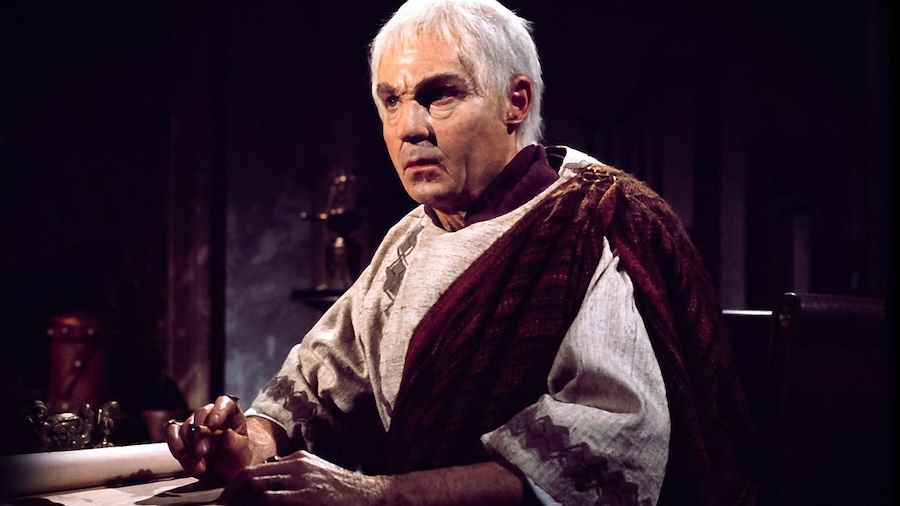ABOVE AVERAGE
LET ALL THE POISONS THAT LURK IN THE MUD HATCH OUT.

One thing is certain. The years may fly by in this adaptation of Robert Graves’s books on the first four Julio-Claudian emperors, but when 77 years have passed very little has changed. Augustus became emperor in part because of the murder of Julius Caesar and Claudius ends his days a victim of poisoning, essentially failing to make a better place of Rome. But as they say in the final episode of this miniseries, it is an amazing story.
Always turning, always scheming
The first scene introduces us to the aging Emperor Claudius (Derek Jacobi) who is about to write his autobiography. He does it in secret, fearful of potential spies and assassins. His story begins during the mighty reign of Rome’s first emperor, Augustus (Brian Blessed). He was impressive, but his third wife Livia (Siân Phillips) was even stronger, perhaps because she manipulated everyone around her but hid her darkest side. As Claudius describes her, her mind was always turning, always scheming.
The first episode details the relationship between Augustus and his old friend Agrippa; Livia’s attempts to make Augustus consider her son Tiberius (George Baker) as a possible successor; and the death of Marcellus, Augustus’s sister’s husband. As Augustus is followed by Tiberius, Caligula (John Hurt) and Claudius, each period is marked by intrigue, debauchery, death and disorder.
Evil is constantly present
Graves (and writer Jack Pulman) basically included every rumor surrounding these giants of history in the story. Evil is constantly present in the shape of Livia who eliminates every person who comes in the way of her power-hungry schemes; Claudius, perhaps the only decent character of the story, watches in disgust as his grandmother commits her crimes… only to realize that Caligula, another grandson of Livia’s, is just as bad – and insane to boot.
John Hurt as Caligula is absolutely riveting, losing his mind bit by bit
When Claudius is forced to become the next emperor after the murder of Caligula, he does what he has to do to keep Rome in one piece. It is ironic (and sad) to watch his attempts in the final episodes to secure the future of the state when we know that his successor, Nero, is a throwback to the bad old days of Caligula. True or not, the story of how a man widely viewed as an idiot (because of his stammer and clumsy demeanor) survived to rule the most powerful place on Earth is cleverly portrayed as a contrast to the despicable events seen as normal in those days. Several actors got their breakthrough thanks to this universally hailed miniseries, including Jacobi as Claudius, Hurt as Caligula (he is absolutely riveting, losing his mind bit by bit), Phillips as the wicked Livia (a predecessor to Alexis in Dynasty?) and Blessed as the temperamental Augustus.
As for production values, there are times when one wonders if the actors will accidentally lean against the cardboard pillars and cause them to collapse. Still, that’s not important. The camera often focuses on the actors’ faces – this is essentially filmed theater where the primary ingredient is the delivery of lengthy but very witty and sharp dialogue.
There’s no doubt that I, Claudius inspired the subsequent trend of supersoaps in the 1980s. There’s plenty of orgies, violent deaths and evil schemes to satisfy fans of the genre, only a tad more sophisticated. As for history… I, Claudius should perhaps not be trusted as an educational tool.
I, Claudius 1976-U.K. 650 min. Color. Directed by Herbert Wise. Teleplay: Jack Pulman. Novels: Robert Graves (“I, Claudius”, “Claudius the God”). Cast: Derek Jacobi (Claudius), Brian Blessed (Augustus), Siân Phillips (Livia), John Hurt, George Baker, Patrick Stewart, John Rhys-Davis.
Trivia: Originally shown in 13 episodes. In 1937, Josef von Sternberg tried to turn Graves’s work into a movie, but it was never completed. Charlton Heston was considered for the lead role.
Quote: “They won’t allow me in because I am a woman, and they won’t allow you in because you’re a fool. That’s strange, when you come to think of it, because it’s filled with nothing but old women and fools.” (Phillips on the Senate)
Last word: “We agreed right at the beginning that we weren’t going to make a period piece. We wanted to make it contemporary. We wanted to make the point that human psychology hasn’t changed much in the last 2,000 years. We don’t throw people to the tigers anymore, but we still fight.” (Wise, The New York Times)
